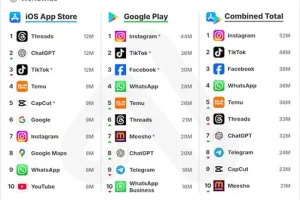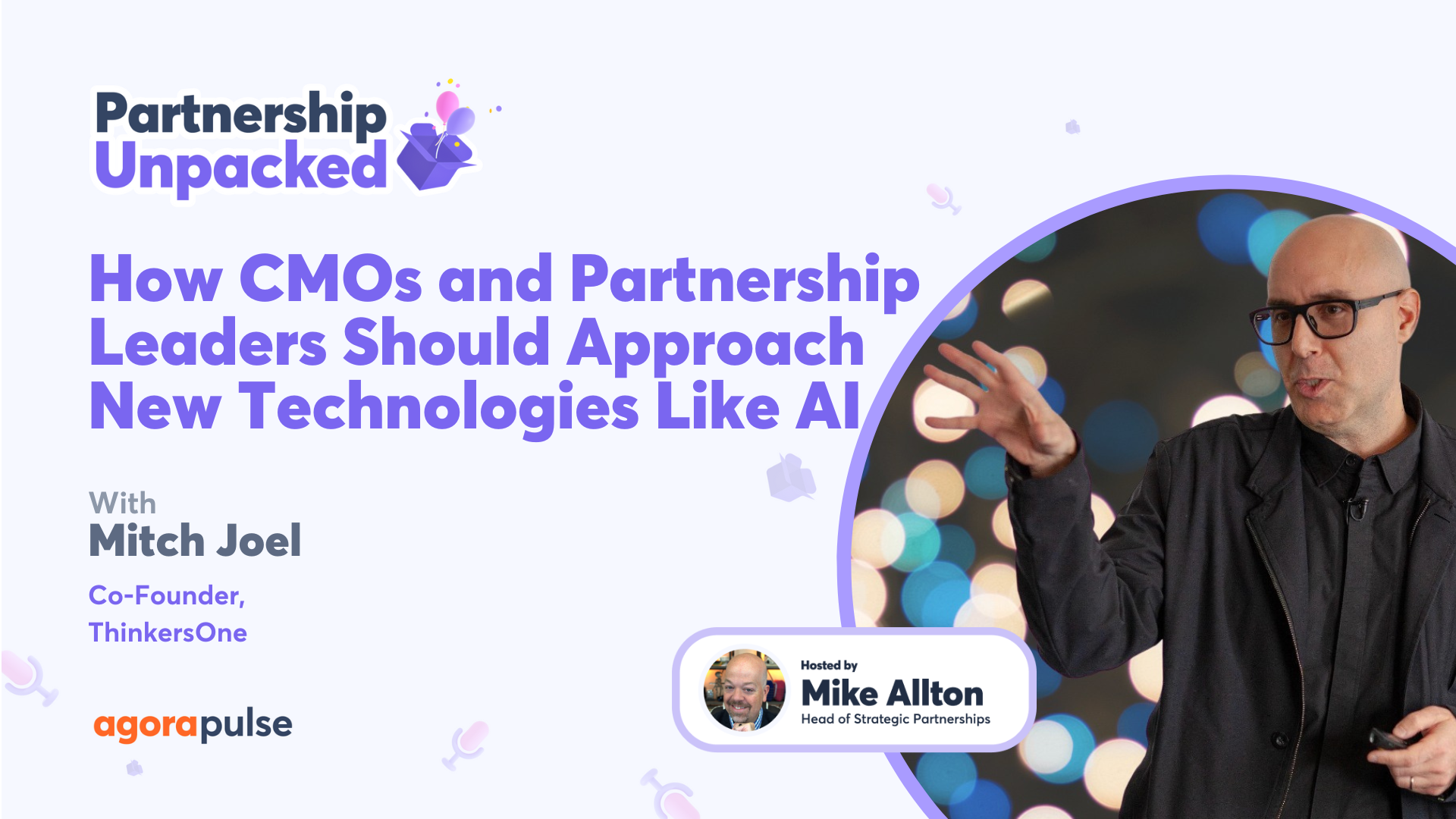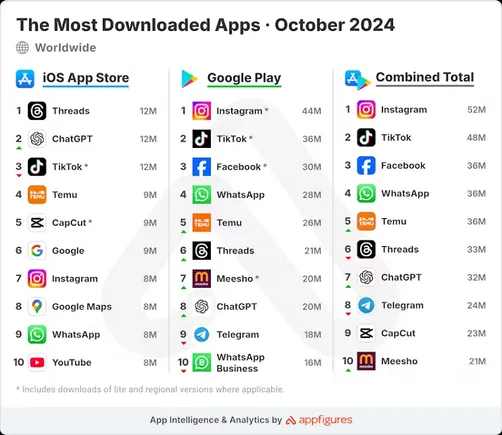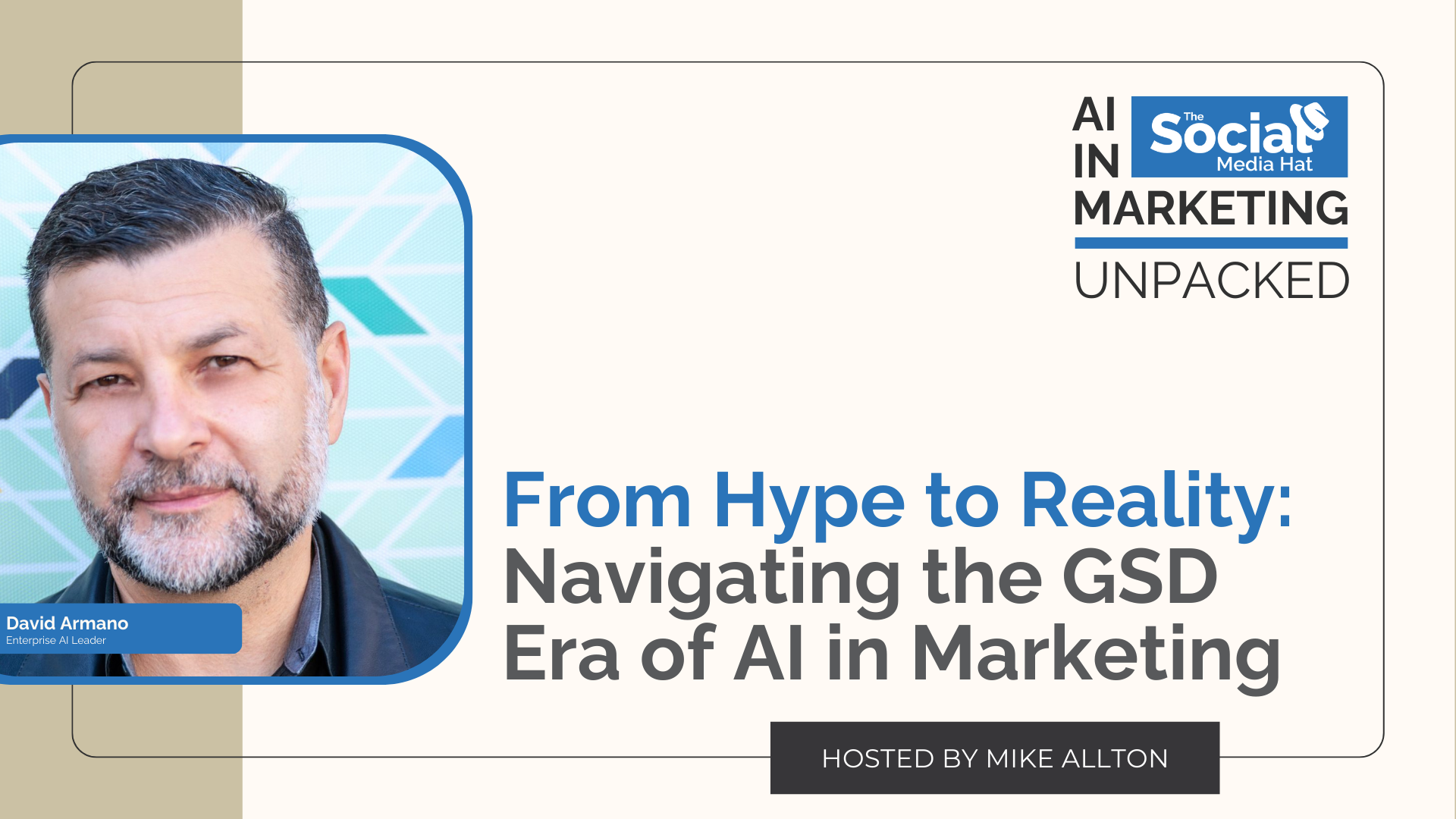In 2022, Google announced that their Analytics product would have an entirely new version by Summer 2023, and that all brands would need to update and change. The year before that, it was announced that the mechanism most marketers used to track website visitor activity, cookies, would be going away.
In those instances, we had advance notice that change was coming. With disruptive technologies like AI, change is thrust upon us seemingly overnight, with CMOs and partnership leaders struggling to catch up by the light of the new dawn.
But change doesn’t actually occur overnight, so shouldn’t we be able to see what’s coming next?
That’s what we’re covering in today’s episode of Partnership Unpacked.
Welcome back to Partnership Unpacked, where I selfishly use this time to pick the brains of experts at strategic partnerships, channel programs, affiliates, influencer marketing, and relationship building… oh, and you get to learn too! Subscribe to learn how you can amplify your growth strategy – with a solid takeaway every episode from partnership experts in the industry.
And this industry… it’s changing!
In past episodes we’ve talked about new networks like Threads, new laws and tools that are impacting influencer marketing and partnerships, and of course how AI is invading every aspect of our lives.
As marketing leaders, it’s incumbent on us to have the vision to see what’s coming around the corner and prepare for it. We need to know whether or not today’s hype is going to disrupt our very business tomorrow, don’t we?
Well that’s exactly what Mitch Joel is going to talk to us about.
When brands like Google, Starbucks, Shopify and GE want to decode the future, they call Mitch. We called him too.
Mitch is Co-Founder of ThinkersOne – a platform that empowers companies with personalized and bite-sized thought leadership from the best Thinkers in the world. His first book, Six Pixels of Separation, named after his successful blog and podcast is a business bestseller. His second book, Control Alt Delete was named one of the best business books of 2013 by Amazon.
And Strategy Magazine called him, “one of North America’s leading visionaries,” which is why he’s here with us today.
Partnership Unpacked host Mike Allton talked to Mitch Joel about:
♉️ How AI is impacting marketing and partnerships today
♉️ Why marketing & business processes are so susceptible to new technologies
♉️ How CMOs and partnership leaders can decode the future
Subscribe to the show calendar: agorapulse.com/calendar
Learn more about Mitch Joel
Resources & Brands mentioned in this episode
Full Notes & Transcript:
(Lightly edited)
How CMOs and Partnership Leaders Should Approach New Technologies Like AI with Mitch Joel
[00:00:00] Mike Allton: In 2022, Google announced that their analytics product would have an entirely new version by summer 2023 and that all brands would need to update and change. The year before that, it was announced that the mechanism most marketers use to track website visitor activity, cookies, That’d be going away too.
In those instances, we had advanced notice that change was coming with disruptive technologies like AI change is thrust upon us seemingly overnight with CMOs and partnership leaders struggling to catch up by the light of the new dawn, but change doesn’t actually occur overnight. So shouldn’t we be able to see what’s coming next?
That’s what we’re covering in today’s episode of partnership unpacked.
This is partnership unpacked your go to guide to growing your business. Through partnerships quickly. I’m your host, Mike Alton. And each episode unpacks the winning strategies and latest trends from influencer marketing to brand partnerships and ideas that you can apply to your own business to grow exponentially.
And now the rest of today’s episode.
Welcome back to partnership unpacked, where I selfishly use this time to pick the brains of experts at strategic partnerships, channel programs, affiliates, influencer marketing, and relationship building. Oh. And you get to learn to subscribe to learn how you can amplify your growth strategy with a solid takeaway every episode from partnership experts in the industry and this industry, it’s changing in past episodes.
We’ve talked about new networks like threads, new laws and tools that are impacting influence from marketing partnerships. And of course, how AI is invading every aspect of our lives. It’s marketing leaders. It’s incumbent on us to have the vision, to see what’s coming around the corner and prepare for it.
We need to know whether or not today’s hype is going to disrupt our very business tomorrow, don’t we? Well, that’s exactly what Mitch Joel is going to talk to us about. When brands like Google, Starbucks, Shopify, and GE want to decode the future, they call Mitch. Well, we called him to Mitch’s co founder of thinkers.
One, a platform that empowers companies with personalized and bite sized thought leadership from the best thinkers in the world. His first book, six pixels of separation named after his successful blog and podcast is a business bestseller. His second book control. I’ll delete was named one of the best business books of 2013 by Amazon.
It’s strategy magazine called him one of North America’s leading visionaries, which is why he’s with us here today. Hey, Mitch, how are you doing?
[00:02:41] Mitch Joel: Hi, Mike. It’s great to see you. And thanks for having me on the show. [00:02:44] Mike Allton: My pleasure. Thanks so much. Now, before we dive into today’s topic, I’d love to better understand thinkers one and the work you and the other thinkers that are doing for brands today. [00:02:54] Mitch Joel: It
emerged out of the pandemic that we had, but it was a request that I was getting quite often, which is not about showing up to give a keynote, which I do, or showing up to a big customer summit. It was requests like, Hey, I have somebody on my team that listens to your podcast every week. Can you send them a quick little greeting?
Let them know that. I care about them and that you have a thought or two for them. It was I’m not looking for a keynote or consulting, but you got 15 minutes. You could record really quickly on generative AI. Or it was something like, look, we’re having our monthly all hands on deck meeting. We’d love for you to pop in and surprise everybody and just hang out and have them ask anything.
And the truth is, if you sell your content like I do, whether it’s speaking, consulting or whatever it might be, What you realize really quickly is the process of selling that keynote is the same amount of work is doing a 15 minute pop in now, since the world of keynotes and other types of thought leadership and the way we sell this stuff, we have new tools like Shopify and e commerce.
And so my business partner, Aubrey and I realized that we could use a platform like this. To make this type of content accessible to everyone, small organizations, medium organizations, nonprofits, or even just larger departments in a larger organization. And so we have essentially created this place where you can buy bite sized and personalized thought leadership.
So there’s two options, go live with the thought leader and, or you can choose topics that they have predetermined and they’ll record a personalized and customized video just for you. So that was the idea. I showed it to a whole bunch of peers who have either appeared on my show or I’ve shared the stage with and everybody got excited.
So right now we have, I think, over 75 thought leaders with 100 more coming on and things are going really well. It’s still early days, still looking for market fit, still tweaking the whole thing, but having a lot of fun selling this because it’s great to make thought leaders accessible to organizations that typically couldn’t afford them.
And that’s the real thing, what we’re doing.
[00:04:55] Mike Allton: That’s fascinating. And I’m so glad I asked because I had no idea the depth and scope just by just glancing at the website and preparing for this call. So gosh, 70. It’s like cameo for business thought leadership, right? [00:05:10] Mitch Joel: Well, I mean, I think the difference between the two one is cameo feels a little bit one and done, you know, hey, it’s I’m a celebrity.
Happy birthday. This isn’t that this is a thought leader. Really providing content and value it’s very much a b2b proposition and also it’s really from the thought leader typically to a group your team your company your client as a thank you gift so can i was more one on one personal like little greeting thing and that is one.
Type of product within the larger scope of what it is, but really what I think this is for is to help re energize employee engagement, whether it’s in your weekly meeting, whether it’s in a lunch and learn, or even to engage with the clients. We are hybrid, whether we like this or not. And I. Aubrey and I both believe that thinkers one is a great tool that satiates whether you’re all there in person, whether you’re hybrid or whether you’re fully remote.
And that was the real ideas. Can we make this information not only accessible, but then make meetings ways or reasons for us to get together more profound. Seems like everybody’s really zoomed out. It seems like you’re seeing even meetings being recorded and then passed along. I believe this is an amazing tool to get some energy back and also to help your employees and team members be their best.
[00:06:26] Mike Allton: Does the format matter? Like for instance, if I were to want to utilize thinkers one for a webinar or a virtual summit, would that be kind of. Too much towards a speaking gig. [00:06:37] Mitch Joel: Yeah, we’re definitely not trying to cannibalize the core offerings of a thought leader. So that’s why they’re short. And that’s why we do them in these video like experiences.
They also can’t be used for commercial purposes. So you couldn’t build a whole summit and then charge people for it. It really is for those internal meetings, those lunch and learns, or as a way to engage a client. That’s how we’re seeing is again, much more B2B, much more internal.
[00:07:01] Mike Allton: Brilliant. I love how you thought through these permutations.
It’s fantastic. Now, so far in this podcast this year, we’ve already had at least three episodes devoted to AI, and it’s been a recurring topic for good reason. And while we’ll be talking about technology in the abstract, I’m curious about what you think about AI in particular. And as an example, the kind of technology brands should be paying more attention.
Attention to what do you make of this AI craze
[00:07:25] Mitch Joel: I mean, I’ve been following it long before it became so commercialized and that would primarily be with the introduction of chat GPT. So I have tons of thoughts and we’ll spend hours talking about it. If you thought one is. I think that our understanding of artificial intelligence needs to be more direct.
We need a real definition and context for it, and I’m not sure there is. It feels like, you know, the old Lion King that everywhere the sun touches, it feels like everything AI touches is like that sun. Just everything is AI these days. I don’t think that’s the case. I think that AI, by definition, is an algorithm that can not only learn by itself, Strategy idea whatever it might be but also be able to explain why and how it did it so when i look at a is a catch all i’m really looking to see if it’s more than just a large language model but truly able to discover and express why it’s doing the things it’s doing.
Within that, we have these generative AI tools, and I think a lot of times we’re confusing artificial intelligence with generative AI tools like chat GPT or mid journey for me. The application of those has been profound. I probably use these tools in both text, images, audio and video. If not daily, multiple times a day.
I use it for different reasons, though. I’m not using it to create the content for me. I’m using it more from a research standpoint. I’m looking at it more for generating better questions or thoughts. I’m trying to see if it can come up with a better or different angle than the one I’ve had. I’m looking for it to call me on my BS.
If I’m being honest as well, give me some opposing perspectives as to how you can use that. And I can tell you that in my keynote that I’ve been giving on this topic for obviously several months now. I love seeing how illuminated the audience gets, because ultimately, I think whether you believe it’s just a silly web interface that provides results that are worse than Wikipedia on a bad day, which is something somebody like Douglas Rushkoff might say, or if it’s more of in that Yuval Noah Harari world of it’s going to destroy democracy and what are we doing in a world where We’re not holding it as accountable to laws and regulations as we are human beings.
There’s a debate in there. That’s the artificial intelligence debate for sure, but ultimately showing it to clients and letting them know that, Hey, I’m going to show you a parlor trick. I’m going to show you a magic trick and I’m going to show you how it’s done. So when it starts running a chat GPT’s prompt and it’s, it looks like, wow, it’s writing it for me.
I’m like, that’s the magic trick. That’s just the web interface. It’s how we use the results to make us better, smarter, come up with better ideas. And for me, it’s, it’s proven that it can do that in a myriad of ways. For sure.
[00:10:14] Mike Allton: How about for something like storytelling specifically, how would you recommend CMOs, partnership agents, folks, marketers like that use? [00:10:22] Mitch Joel: Hey i for storytelling similarly to where i stood but will speak in particular to this so the first thing you could do is ask it hey if i wanted you to act like a chief marketing officer that represents company xyz that services people like this can you do that. And usually, always, it’ll say, Yes, I can.
And it’ll point to a whole bunch of reasons why it has that intelligence. Now you need to go through that and tell it this is right. This is wrong. I want you to think more about this. You have to train it because that’s ultimately what these generative AI tools are for. From there, you could say to it.
Okay. Now I want you to not just think like that, but create for me 10 compelling article titles based on issue XYZ that faces my industry. It’ll probably do that. Then you can choose the one you like most and say, write a 300 word article for me on this topic. Use this type of tone, use this type of voice, all those types of things.
You can see what that looks like. My next favorite thing to do after that is to say to it now act like a media theorist and give me five opposing reasons why that article is wrong from there. You can start piecing together some really interesting ideas and concepts so you could see that from a storytelling perspective.
I like it because. It pushes me away from this idea of what should I write about? What’s relevant today? What’s important? Somebody said this about this article or this tweet came out post. I guess we call it now because it’s X. And it gives me this freedom to really play without having to stress so much about the blank page.
And from that I can then, as a person who’s got some journalist background, storytelling background, figure out where I want this story to go. The challenge with that is, is you have many people who will use that. Yeah. As the story now in the absence of anything, I guess that’s something is better than nothing.
So there’s no doubt that you’re going to see and we’re already seeing this, this mass creation of generative AI tools created stories. And again, I could go either way on this. Some of them are terrible and it’s not going to work. Some of them are really smart and intelligent and probably better than anything that individual or that team could come up with.
It’s hard to debate the power of that. I mean, we are seeing things like Google and other platforms being able to see what truly is generative AI and what isn’t. But again, if you don’t use it as the solution, but as a jumping off point as a copilot, as an assistant, I think these are really powerful and profoundly changing tools to both the chief marketing officer’s job and anybody who’s involved in storytelling in the organization.
[00:13:00] Mike Allton: You’re absolutely right. I’ve seen countless people using those tools simply to create content as fast as they possibly can. But I love the nuance you brought to it, where you’re, you’re talking about, first of all, training the AI to better understand who you’re trying to talk to, or who you’re trying to talk.
As and then I love that point about using it to go back and find the flaws and the faults in the content that it just created. It’s brilliant.
[00:13:26] Mitch Joel: The other thing is we have this conversation people is creating all this content. Okay, but before I we had a bunch of people creating crappy content anyways, like content farms isn’t a new word to you and I was been around for decades.
We have been using People who write either cheaply or live in an area where we can have them create a bunch of content or they themselves are scraping and manipulating and doing it so now that you have some type of digital technology doing it we all sort of throw our arms and go what about the we were doing it before it’s the scale it’s the magnitude of it and i think the truth of the matter is.
It can do it sometimes better than some of the ways in which people were doing it before, just paying for someone who doesn’t have that much experience in journalism or stories. I’ll just create this, you know, prep. I mean, essentially, you’ve seen it. We’ve experienced, you know, 13 reasons why you need newsletters.
So yeah, it’s, it’s wild to see a chat GPT pump that out, but it’s not wild in the sense of if you have skill, if you understand storytelling, if you understand how to write or tell better stories, you realize right away that. Yeah. You know, this is not usable really, if you want quality, but it does help you get to a place where it might help you solve angles or problems that again, you just forget as you’re building out the story.
[00:14:43] Mike Allton: Folks, this is my one day Mitch on the show. He’s got this brilliant perspective. We’re going to tap into that mind in just a moment, but here to share with us how we’re leveraging AI at Agorapulse to help our own clients is Darryl Prail, our CMO. Hey there, Darryl
Prail, chief marketing officer here at Agorapulse, the industry’s best social media management platform.
I gotta tell you, I love AI. Why? I don’t view it as a threat. Rather, it makes me better. It’s a colleague. It’s a collaborator. Let’s say I do a social media post, but you know what? I’m a little long winded. I want it shorter. Maybe I want it longer. Maybe I want it punchier, more assertive, more inspirational, more funny.
That’s what our writing assistant does. Check it out. Agorapulse. com
Mike, I think you need to give me access to Agorapulse. Let me try
it. Yeah, I’d love to.
That’s fantastic. Yeah. All right. So hot take. Do you think the metaverse is still a developing technology that brands should be paying attention to? Why or why not?
[00:15:42] Mitch Joel: Ultimately. Ultimately. Forget the metaverse for a second should brands be paying attention to dot dot dot the answer is brands will always pay attention to platforms channels or technologies that have other people’s attention so the answer to the question right now is.
Are your customer users partners engaged in that type of technology? And if they are, why aren’t you there? Do you feel like there might be a little bit of a land grab or an opportunity to plant the flag now? Some people like to leverage this from a public relations perspective of we are the first were the only were one of to be involved in this now.
The metaverse i think the challenge i’ve had and i’ve had this debate really aggressively i think on my podcast is what is the metaverse i mean this is the big thing is the metaverse these goggles that we’re strapping on and the content that comes through it is it what we’re going to see from apple vision pro is roblox and fortnite is that the metaverse.
Is the metaverse this place where you buy virtual real estate is it goes on and on and on to the point where it feels like the metaverse is a catch all for what will the next interface of the Internet or connectivity be now that could be a fair definition of it, but saying then should marketers care about that?
The answer is, well, yeah, of course you should care about. What’s coming next and where the world is going, has it been validated? We haven’t seen it. I mean, all of the excitement over apple vision pro as an example, well, we’re now hearing rumors that they’re only going to produce a minimal amount of actual headsets ultimately.
So we’ll see. It looks very promising then all of a sudden you’re like oh i don’t know if it’s gonna deliver on that we’ve seen facebook quest and their virtual reality or augmented reality platforms come a long way but not exactly be where the adoption is there put all that aside. Mitch if you’re asking me do i believe that we will move away at one point from these flat two dimensional screens to having content anywhere and everywhere.
How will it be projected? Is it going to be from a wearable? Is it going to be from physical locations? Is it going to be like radio waves and the amazing technology that that was when it was first invented? I don’t know. So I do believe in what I would call a screen list world and that somewhere in the near future, it doesn’t seem viable right now.
Right now in this moment, but things change in an instant and we were talking about the metaverse and what’s happening with crypto then all of a sudden chat GPT came in and we said, you know, so we’re the squirrel. Where’s the next shiny object that we’re chasing? I think the metaverse is real. I think there is something there, I just don’t believe it’s produced either the killer app or a clear definition to consumers about what it is and how they engage with it and what it means.
So do I think Roblox is viable? Of course I do. Do I think Fortnite is viable? Of course I do, depending on your brand and what you’re trying to connect with. Do I think Apple Vision Pro looks amazing? I absolutely do. Is it going to permeate to the greater mass market? We’re going to see, is it relevant to you, your brand, your consumers?
The only answer to that question is, what is your brand, who are your consumers, and where are they?
[00:19:03] Mike Allton: Brilliant answer to the metaverse question, and I love the fundamentals that you weaved in right from the start about how brands should be thinking about. Any given dot dot dot technology, and we’re going to circle back to that.
But one concept that I heard you share that I just find fascinating is this idea that our businesses and our marketing are now made up of countless micro transactions. On the example I heard you share was that if a prospect watches a video and then signs up for a newsletter and then later becomes a customer.
That’s a series of microtransactions that most of us are not tracking or paying enough attention to. Could you help folks understand how that works and how susceptible such transactions are to new technologies?
[00:19:43] Mitch Joel: You’re quasi pushing me on my heels, Mike, because I haven’t even thought of that concept in years.
So it goes to show you that you push things out, whether it’s in a book, a blog post, a podcast, a public platform, and you move on from it because it’s just the nature of, of, of how we create content. But I still think that’s true that when we think about what a conversion is, usually the real conversion is the sale, the Ka ching.
It did they become a one time customer. I have a Nash Kaushik brilliant evangelist and analytics person says that they’re not really your customer until they buy from you twice. And I always love that analogy as well. But it’s true that in that we have what I called at the time these micro transactions.
Did they spend time on your social platform that they like a comment that they commented? You respond. Did you capture an email that they watch a video? Did they subscribe to your tick tock channel? Are they watching this? Do they care? Where are they in that? And I think we. Really often forget about how important the nurturing phase is.
And I say this because we create a lot of content. I do, you do, the company does, everyone creates a lot of content. And I think you could have customers that haven’t been transactional with your product, but actually act as incredible evangelists. They rely on you, they find you trustworthy, they like your content, they like connecting with who you are, your personality, the topics you cover, the guests you invite.
We do discredit that and tend to chase the opaque unknown without realizing that sometimes even nurturing them to refer others, which we’ve seen in affiliate marketing and other platforms, how powerful that is. So I’m always very specific in not dismissing how a transaction isn’t just the cash register ringing.
[00:21:31] Mike Allton: Right. And we’ve got a I and new technologies that are being integrated into every layer of marketing, social media, content creation, websites and so on. And they’re having an impact on these transactions. And to your point, if we’re not paying attention to Where these transactions fit in these nurturing cycles with our, with our customers, how can we possibly be prepared for how a new chat bot is going to impact our sales? [00:21:59] Mitch Joel: Well, my evolution on that thought would also be like, really look candidly at your social platforms and really look at growth. And if you’re gaining single digit, double digit. Followers every week that’s stagnant and i’m not saying that you haven’t reached your discernible market and you haven’t done your homework Maybe you have and that’s just great and it’s more of a churn retention strategy.
It’s very very possible But when I have these conversations with people I think we as the content creators get really stagnant like we think we have our formula and this is the way to do it and this is how people expect the content but it’s actually not working because it’s not growing or reaching a farther enough audience and what’s gonna happen is new customers logically are gonna come in as you build that base wider and wider so i think we have so many brands who are currently.
Speaking and think they have this great reach in this great platform and not realizing how dried up it actually is that they’re actually not really growing it they’re not all that original and that a lot of times you have these followers but they’re not even really engaged now it’s not just the brand that has to deal with that it’s just the fact that there’s.
A ton of content every day someone asks me to be on a on a podcast and my reaction is you know one do they know i have a podcast and two what does it say about me that i didn’t know they had a podcast this is the world that we operate in and so the challenges of actually growing an audience. Growing these microtransactions, trying to get more of them is more complex than I think people think, because we all just tweet out to our verified accounts and think it’s not called tweeting, right?
That’s called posting. We all post on X to our to our audiences. And we think, well, you know, it’s it looks really good. And my real question is, is it, I mean, is it really good or is this just going through the motions and very repetitive? It’s hard to know that’s the evolution of that. And that’s the complexity of it in today’s marketing world.
[00:24:01] Mike Allton: And this is the kind of thing that I am hopeful and optimistic that AI will have a much. More prominent place in the future, being able to tell us things like that, because a eyes is excellent at bringing in all this big data information and sharing summaries specific or general and telling us, yes, this is what this is not working.
And there’s why. So that’s fascinating.
[00:24:24] Mitch Joel: Yeah. And I also think it’s going to be great to use it to iterate and test. So you might sit here and think, You know, we haven’t done much on Instagram, or I’m not sure about Instagram for B2B or whatever it might be. If you have all these inputs and the AI is trained on your content, its ability to be able to create something basic and cogent that you could then test repeatedly in a platform like Instagram, in this instance, is really powerful.
And I’ve, I’ve done it for that. In fact, in the example I gave earlier, I’ll tell it at the end to build a five Addition email newsletter based on whatever criteria we’ve whittled it down to and then I’ll tell it to create three social media posts for these four different platforms, but make all the content uniquely different.
Don’t include hashtags, do include hashtags, whatever it might be, and it’s very illuminating to see because you realize that the ability to use it to test your predisposed ideologies is so much easier than. We’ve got to brief the team. We’ve got to brief the agency. We’ve got to go through all this rhetoric versus I could just post and try.
I like it from not just the analytic side, which I fully agree with, but from that quick testing and seeing, I like it a lot. And by the way, like that’s now, that’s not like in the future we’ll be able to, we can do that right now.
[00:25:45] Mike Allton: Fantastic. Now you’ve got an entire talk that you give on disrupting disruption.
And I know business owners and event organizers that you’re listening to that. You would be very smart to schedule Mitch to come into your organization or event and give that talk. But based on that, how do you advise CMOs, as you say, to decode the future? See what’s next and prime their business for tomorrow in a very simplistic way.
[00:26:08] Mitch Joel: What I see is it’s something that feels like immediate dismissal, right? So you might think I run a B to B sass business. What does Netflix have to do with what I’m doing? So we dismissed Netflix as a model. We use it every day. We binge watch, we do all these things, but we don’t think about it in relation to our business.
My thesis in disrupting disruption is not about the speed of technology. I think that’s actually very boring and tired. Of course, things move fast. We need to respond. We need to be quick. Like a hundred percent. Yes. My thesis is what have we seen from disruptive technologies in relation to how it’s changed, how consumers buy, so if we unpack.
Netflix or streaming services. We see it across the board. In fact, we’re at a place right now. We’re just in the news. They’re saying that we’re actually spending more for these services than we did for traditional cable services. No surprise there. But the real thing is this, is that instead of buying or paying for a thing, customers have become accustomed to paying a monthly fee for access to a library.
So if you can parse that into your B2B SaaS business, you could say. What libraries do we have are there ways in which we can enable our customers to self serve off of that do we charge my monthly fee for that or do we give it to them free as a marketing engine to make them more loyal to us how much of a differentiator with that make us in relation to our competitors and you can slowly take that thread and keep going with it and realize actually.
Netflix streaming services, there is a business model there, whether it’s marketing communications or an actual new business model that might be extremely viable for our business. So when I talk about disrupting disruption, people tell you’re a futurist. My joke is I’m a presentist. I like taking technologies that we all know and use and figure out if there’s a way to unpack it or splice it in a different way that might actually force us.
To create, even at the best level, a new business model, which by the way, we have seen, we’ve literally seen businesses look at this, apply to their industry, apply to their company, and extract an entirely new business model. I can give you a quick example if you want. You want a quick example, please? Yeah.
So an example would be right around the corner. We have a world-class sushi restaurant, and it was one of those places, six months to get a reservation. Uh, impossible. Covid comes, they shut down. If you’re this iron chef, this celebrity personality, you might say to yourself, enjoying my restaurant is a physical experience of 60 people per serving.
We’ll do two of those a night. It’s the way we presented and played it. It’s the music. It’s the core all true. Suddenly this person, because of the pandemic is doing takeout and delivery. Now that’s an entirely different business. And by the way, I’d even argue that a restaurant trying to start that when they hadn’t before the pandemic.
Really difficult to do, but then they started doing things like, Hey, every Sunday we’ll deliver fresh sashimi to your doorstep. You have to buy it in four or six weeks. I don’t remember what the length was. So again, pause. That’s Netflix. They created a subscription model for sushi. Then the other thing they did was for a very small additional fee, the chef would come on to zoom or whatever it was at the time and hang out, talk to people, a virtual meeting, re talk about maybe the fish, how to prepare it, all these things.
Suddenly, they’re an online learning and online education. So again, doors open back up. Thankfully we come out of this a little bit. Who knows where we are in this world with new variants and vaccines and other things, but you know, here we are. It seems like it is definitely a much more normal world. And the question I would propose is should that restaurant stop doing takeout and delivery?
Should they stop doing the Sunday sashimi delivery? Should they stop doing the celebrity chef show up? I would answer that and say, no. They have actually uncovered new business models and new marketing engines that have fundamentally changed your business and might open their doors up to more and more customers and more and more opportunities to trick and that is so many people wanted to go back to the way things were that they stopped those initiatives without understanding that they were actually not only disrupting themselves, but truly making them differentiated from all of their competitors.
So that would be a very small business. Easy example that if you want to scale it up, just look at apple. You know, Apple’s generating what, 50 billion every quarter just from services, which is why they want to disrupt healthcare services, which is why they’re looking at models where your next iPhone might actually be a subscription where you don’t buy the phone, but you subscribe.
So you just see this at scale from small mom and pop on the corner to the biggest of biggest companies generating the trillions of dollars in terms of market capitalization. It just means that it’s applicable and accessible to all of us. So I don’t go crazy with things like, is it NFTs or not NFTs? I look at things like NFTs and think, well, in the physical world, we have objects that are both scarce and abundant.
In the digital world, We never had scarcity. If we could apply scarcity to a digital product, is that an engine of marketing or potentially a new business model? And I think the answer is really obvious. So let the board apes crash, let the lawsuits ensue between Sotheby’s and Paris Hilton and whoever else, but ultimately assigning scarcity to digital assets, I think is going to open up a ton of new opportunities from both a marketing and business development perspective for sure.
[00:31:20] Mike Allton: That’s fascinating. I’m so glad you shared that example. It really helped illustrate the point that you were sharing. And I know you said you’re a presentist, but I’m curious if there are any new technologies that you’re seeing kind of on the horizon that you think marketing executives should be at least aware of. [00:31:36] Mitch Joel: I think all of them are coming at us. All at once, it would be hard not to talk about digital currencies, whether that’s crypto or beyond, it’d be hard not to talk about things like blockchain technology in terms of contracts and ways in which we could partner with people or create that scarcity. And after he’s too, as I just mentioned, AI is a monster onto itself of a multiplier on top of that, while at the same time, I would still.
Make the argument that we haven’t really mastered social media yet our ability to really understand that you can create text images audio video instantly record them do it live short form long form and actually distributed at scale. To connect our content that’s created in a human way to another human i don’t know that we see what we see we get very excited when we see things like mr beast or whatever but at the end of the day i don’t know that any of us could look into the webcam and say candidly that we’ve hit our full assertable market and so to me that still provides a tremendous opportunity that you can go.
Further back and talk about things like email and e newsletters and the pushback might even be what technology shouldn’t we be paying attention to. I’m not sure. I think that is our job. Our job is to understand the world, the culture that lives within it, the potential customers that might want to buy from us and how we’re going to ethically, valuably connect ourselves to that.
So does this ever end? Is there anything not to talk about? I’m not so sure, Mike. I wish there was, but I, I could, we could do this again for hours and hours.
[00:33:12] Mike Allton: No, and I love that. And what a perfect way to wrap up the segment. I’ve just got one final question for you. And this is a question I ask everybody.
In fact, this is why our mutual friend Laura Gassner Otting started to talk about you on our show. How important have relationships been to your career?
[00:33:28] Mitch Joel: Oh, I mean, it’s funny. I do another podcast where I interview bass players called groove, the no trouble podcast. You can find that no trouble. com. And I’ve been doing that for close to 10 years.
It’s a monthly show. It’s not no trouble. com is not my site. I just host the show for them. And just today I was talking to Bobby Wooten, the third, who most people might recognize if you saw David Burns, American utopia, he’s the bass player in that, but he’s played with Carly Rae Jepsen and a million other people’s TV show empire and all this stuff.
And we were talking about how he had built this network when he was studying music at music school and how it led to all these opportunities and I was reminded of one of my favorite quotes, which I use all the time, Jeffrey Gittermer, who authored the sales Bible that read book selling and anything he writes, I follow.
I think he’s both hilarious and very, very smart when it comes to sales. Eons ago, he said that his network is his net worth. And whether it’s that coupled with i was very impacted when the book never eat alone by keith for rossi came out very impacted by that book and how that works and i really realized from a very young age that my network is my network so i spend.
A great deal of my time trying to make connections even my content when i think about how i’m creating it and distributing it i think about it in relation to hoping that it’s building some type of network so it’s my everything and i spend a lot of time and energy. Both professionally and I try personally as well to make those connections count.
I think they’re everything.
[00:35:00] Mike Allton: That’s so cool. I’m so glad you mentioned that story. It’s one of the funny things about this question. I just asked people how important and invariably it prompts them to think about some specific relationship or some event that happened in their past and they share some fantastic stories.
So thank you so much for sharing that, Mitch. And we’ll have all the links in the show notes, but please let everybody know where they can find Find you that want to learn more about you or have you come in and speak to their event organization.
[00:35:27] Mitch Joel: Three easy ways. One, go to thinkersone. com. That’s where you’ll see the new startup that we’re working on.
Two would be sixpixels. com and three would be mitchjoel. com, but truthfully mitchjoel. com and sixpixels. com and even thinkersone, they kind of all interlinked. So Google Mitch Joel and you’ll find it.
[00:35:42] Mike Allton: Fantastic. That’s all we’ve got for today, friends, but please, please, please subscribe and follow us on Apple and leave us review.
We’d love to know what you think until next time. Thank you for listening to another episode of partnership unpacked hosted by Mike Alton and powered by Agorapulse, the number one rated social media management solution, which you can learn more about at agorapulse. com. If you enjoyed this episode, please subscribe on your favorite podcast player.
Be sure to leave us a review. Your feedback is important to us. And if you want to be part of our audience during live broadcasts, take a look at our calendar at agorapulse. com forward slash calendar.










